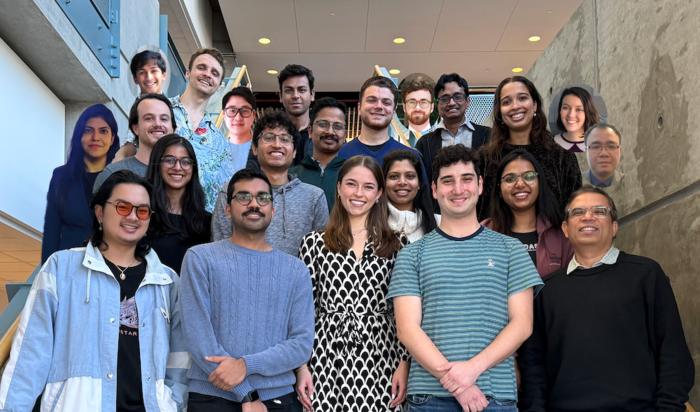Nylon, Teflon, Kevlar. These are just a few familiar polymers — large-molecule chemical compounds — that have changed the world. From Teflon-coated frying pans to 3D printing, polymers are vital to creating the systems that make the world function better.

Credit: Georgia Tech
Nylon, Teflon, Kevlar. These are just a few familiar polymers — large-molecule chemical compounds — that have changed the world. From Teflon-coated frying pans to 3D printing, polymers are vital to creating the systems that make the world function better.
Finding the next groundbreaking polymer is always a challenge, but now Georgia Tech researchers are using artificial intelligence (AI) to shape and transform the future of the field. Rampi Ramprasad’s group develops and adapts AI algorithms to accelerate materials discovery.
This summer, two papers published in the Nature family of journals highlight the significant advancements and success stories emerging from years of AI-driven polymer informatics research. The first, featured in Nature Reviews Materials, showcases recent breakthroughs in polymer design across critical and contemporary application domains: energy storage, filtration technologies, and recyclable plastics. The second, published in Nature Communications, focuses on the use of AI algorithms to discover a subclass of polymers for electrostatic energy storage, with the designed materials undergoing successful laboratory synthesis and testing.
“In the early days of AI in materials science, propelled by the White House’s Materials Genome Initiative over a decade ago, research in this field was largely curiosity-driven,” said Ramprasad, a professor in the School of Materials Science and Engineering. “Only in recent years have we begun to see tangible, real-world success stories in AI-driven accelerated polymer discovery. These successes are now inspiring significant transformations in the industrial materials R&D landscape. That’s what makes this review so significant and timely.”
AI Opportunities
Ramprasad’s team has developed groundbreaking algorithms that can instantly predict polymer properties and formulations before they are physically created. The process begins by defining application-specific target property or performance criteria. Machine learning (ML) models train on existing material-property data to predict these desired outcomes. Additionally, the team can generate new polymers, whose properties are forecasted with ML models. The top candidates that meet the target property criteria are then selected for real-world validation through laboratory synthesis and testing. The results from these new experiments are integrated with the original data, further refining the predictive models in a continuous, iterative process.
While AI can accelerate the discovery of new polymers, it also presents unique challenges. The accuracy of AI predictions depends on the availability of rich, diverse, extensive initial data sets, making quality data paramount. Additionally, designing algorithms capable of generating chemically realistic and synthesizable polymers is a complex task.
The real challenge begins after the algorithms make their predictions: proving that the designed materials can be made in the lab and function as expected and then demonstrating their scalability beyond the lab for real-world use. Ramprasad’s group designs these materials, while their fabrication, processing, and testing are carried out by collaborators at various institutions, including Georgia Tech. Professor Ryan Lively from the School of Chemical and Biomolecular Engineering frequently collaborates with Ramprasad’s group and is a co-author of the paper published in Nature Reviews Materials.
“In our day-to-day research, we extensively use the machine learning models Rampi’s team has developed,” Lively said. “These tools accelerate our work and allow us to rapidly explore new ideas. This embodies the promise of ML and AI because we can make model-guided decisions before we commit time and resources to explore the concepts in the laboratory.”
Using AI, Ramprasad’s team and their collaborators have made significant advancements in diverse fields, including energy storage, filtration technologies, additive manufacturing, and recyclable materials.
Polymer Progress
One notable success, described in the Nature Communications paper, involves the design of new polymers for capacitors, which store electrostatic energy. These devices are vital components in electric and hybrid vehicles, among other applications. Ramprasad’s group worked with researchers from the University of Connecticut.
Current capacitor polymers offer either high energy density or thermal stability, but not both. By leveraging AI tools, the researchers determined that insulating materials made from polynorbornene and polyimide polymers can simultaneously achieve high energy density and high thermal stability. The polymers can be further enhanced to function in demanding environments, such as aerospace applications, while maintaining environmental sustainability.
“The new class of polymers with high energy density and high thermal stability is one of the most concrete examples of how AI can guide materials discovery,” said Ramprasad. “It is also the result of years of multidisciplinary collaborative work with Greg Sotzing and Yang Cao at the University of Connecticut and sustained sponsorship by the Office of Naval Research.”
Industry Potential
The potential for real-world translation of AI-assisted materials development is underscored by industry participation in the Nature Reviews Materials article. Co-authors of this paper also include scientists from Toyota Research Institute and General Electric. To further accelerate the adoption of AI-driven materials development in industry, Ramprasad co-founded Matmerize Inc., a software startup company recently spun out of Georgia Tech. Their cloud-based polymer informatics software is already being used by companies across various sectors, including energy, electronics, consumer products, chemical processing, and sustainable materials.
“Matmerize has transformed our research into a robust, versatile, and industry-ready solution, enabling users to design materials virtually with enhanced efficiency and reduced cost,” Ramprasad said. “What began as a curiosity has gained significant momentum, and we are entering an exciting new era of materials by design.”
Journal
Nature Reviews Materials



